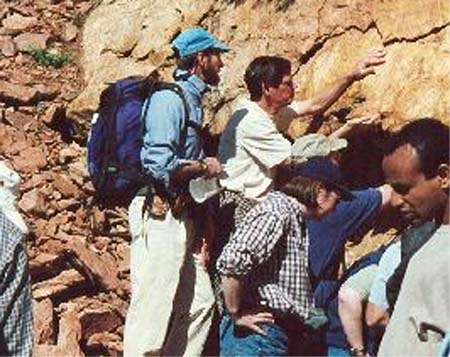
The Effect of Peace Corps on a Geologist's Career by Ghana RPCV Robert A. Levich
THE EFFECT OF PEACE CORPS ON A GEOLOGIST’S CAREER
LEVICH, Robert A., U.S. Department of Energy, Yucca Mountain Project, 1551 Hillshire Drive, Las Vegas, NV 89134, bob_levich@ymp.gov.
Early, in 1963, the late Dr. William Donn, Research Geophysicist at Lamont Geological Observatory and Professor of Geology at Brooklyn College, CUNY stated his belief that my prospective Peace Corps service in Ghana would provide career opportunities that might otherwise be unavailable. 40 years later, his insight has proved true.
At 21 years of age, I held a B.Sc. in geology and had little experience beyond geology field camp in Utah. My academic interests were uncertain, and my professional goals were secondary to residing in New York City, the Center of my Universe. My Peace Corps service in Ghana, 1963-65, did lead to many opportunities and Returned Peace Corps Volunteer (RPCV) geologists played a major role. A fellow PCV geologist convinced me to attend graduate school at the University of Texas, where I studied hard rock economic geology, and my MA thesis evaluated a silver mining district in the Sierra Madre of Durango, Mexico.
I returned to the Ghana Geological Survey in 1969 to study gold deposits. In 1973, an RPCV’s recommendation led the US Atomic Energy Commission (AEC) to hire me to evaluate domestic uranium resources. Another RPCV was Vice President of the mining company that hired me in 1981. In 1982, my AEC and Peace Corps experience led the International Atomic Energy Agency (IAEA) to select me to evaluate uranium resources in Uganda and Somalia, and in 1984, an RPCV aided my return to DOE. One year later, DOE chose me to develop a multi-national study of a Brazilian uranium deposit as an analogue to a nuclear waste repository. In 1989, DOE selected me to manage all international technical cooperative programs in deep geologic disposal, and I was later appointed as US Delegate to an OECD/Nuclear Energy Agency Technical Advisory Group in Paris, where I have served for 14 years.
I’ve lived and worked in the West for 30 of the past 40 years, spent eight overseas and only two in the eastern US. I studied mineral deposits for 20 years, and since 1984, my efforts have been devoted to the deep geologic disposal of nuclear waste. The Peace Corps unquestionably defined my career and paved my way to participate in scientific programs in 20 countries on five continents.
2003 Seattle Annual Meeting (November 2–5, 2003)
Session No. 41
Public Policy
Washington State Convention and Trade Center: 2B
1:00 PM-3:45 PM, Sunday, November 2, 2003
